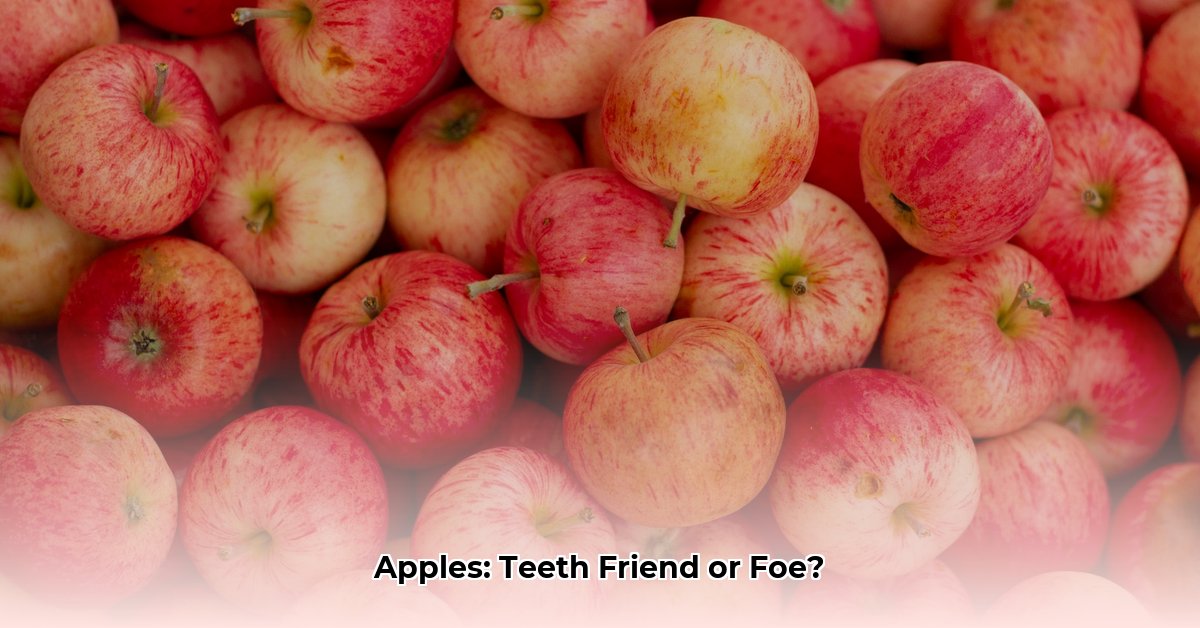The Apple-a-Day Dilemma: Friend or Foe for Your Teeth?
The notion of “an apple a day keeps the doctor away” is deeply ingrained in our culture. But what about the dentist? While biting into a crisp apple feels like a natural toothbrush, the relationship between apples and your teeth is more nuanced than you might think. Let’s unravel the sweet and sour truth about how apples really affect your smile.
The Good: Why Apples Can Be a Smile’s Best Friend
Apples offer some surprising benefits for your oral health, primarily due to their texture and composition:
- Saliva Power-Up: Crunching on a firm apple stimulates saliva production. Saliva is your mouth’s natural defense system, washing away food particles and neutralizing acids that can harm tooth enamel. Think of it as a mini-mouthwash built into your snack!
- Natural Cleaning Action: The fibrous texture of an apple acts like a gentle scrub brush, further dislodging debris and plaque from your teeth. While not a replacement for brushing and flossing, it certainly helps!
- Vitamin C Boost: Apples are a decent source of Vitamin C, an essential nutrient for healthy gums. Strong, healthy gums are the foundation of a vibrant smile.
- Malic Acid Magic: Apples contain malic acid, a natural substance that can help dissolve plaque. Think of it as a mild, natural teeth whitener! Some research even suggests that malic acid can stimulate saliva production, further enhancing its cleaning power.
The Not-So-Good: The Sour Side of Apples
Despite their advantages, apples also present potential downsides for your teeth:
- Acidity Attack: Apples are naturally acidic. This acidity can temporarily soften tooth enamel, making it more vulnerable to wear and tear, especially from brushing immediately after eating.
- Sugar Rush: While the sugar in apples is natural, it still provides fuel for the bacteria in your mouth that produce cavity-causing acids. This doesn’t mean you need to avoid apples altogether, but it underscores the importance of moderation and a good oral hygiene routine.
The Verdict: Striking a Balance
So, are apples good or bad for your teeth? The answer is: both. They offer genuine benefits, but also carry potential risks if consumed without care. The key is to maximize the positives and minimize the negatives.
Actionable Advice: How to Enjoy Apples the Smart Way
Follow these simple steps to reap the rewards of apples without compromising your smile:
- Rinse and Repeat: After enjoying an apple, swish water around your mouth for 30 seconds to wash away lingering sugars and acids.
- Delay Your Brushing: Wait at least 30 minutes after eating an apple before brushing your teeth. This allows your enamel to re-harden after being exposed to acid. Current research suggests this timeframe, but ongoing studies may refine this recommendation.
- Choose Wisely: Opt for sweeter, less acidic apple varieties like Fuji or Gala. Tart apples like Granny Smith tend to be more acidic.
- Make It a Meal: Enjoy apples as part of a balanced meal rather than a standalone snack. This helps buffer the acid’s impact and stimulate more saliva.
Addressing Related Concerns
Tooth Sensitivity
If you experience tooth sensitivity after eating apples, the acidity might be the culprit. Try choosing less acidic varieties and rinsing your mouth with water afterward. Persistent sensitivity warrants a visit to your dentist to rule out underlying issues. They may recommend desensitizing toothpaste or other treatments.
Enamel Erosion
Concerned about long-term enamel erosion? Following the advice above can significantly minimize the risk. Regular dental checkups are crucial for monitoring your enamel health and catching any potential problems early. Your dentist can also offer personalized advice and preventive measures like fluoride treatments.
Apple FAQs: Your Questions Answered
- Should I brush right after eating an apple? No, wait at least 30 minutes to allow your enamel to re-harden.
- What other foods are good for my teeth? Cheese, milk, leafy greens, nuts, and crunchy vegetables like carrots and celery are all excellent choices. Dairy products are rich in calcium and phosphate, which help strengthen teeth. Leafy greens provide vitamins and minerals essential for oral health. Nuts offer healthy fats and fiber, and crunchy vegetables have a similar cleaning action to apples.
Conclusion: The Apple’s Place in a Healthy Smile
Apples can certainly be a part of a healthy diet for your teeth if you enjoy them mindfully. By following these simple tips, you can savor the flavor and nutritional benefits of apples while protecting your pearly whites. Remember, this information is for general knowledge and doesn’t replace professional advice. Consult your dentist for personalized guidance based on your individual needs. They can assess your current oral health and provide tailored recommendations. Ongoing research continues to explore the complex relationship between diet and oral health, so stay tuned for future updates.
- Cooking Kits Make Mastering New Recipes Fun for Everyone - February 4, 2026
- Leak-Proof Glass Food Containers with Locking Lids Keep Food Fresh - February 3, 2026
- Glass Storage Containers With Glass Lids That Lock for Freshness - February 2, 2026










